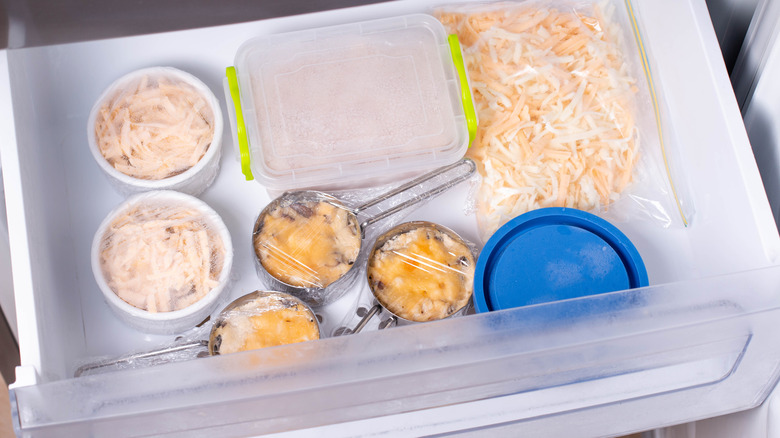You Should Think Twice About Freezing Cheese
Cheese can be a wonderful addition to pasta, salads, omelets, and homemade desserts, offering both flavor and nutrition. Perhaps not surprisingly, cheese is considered a superfood due to its probiotic content. Just like yogurt, most types of cheese are rich in good bacteria that support gut health, according to clinical research published in the journal Engineering in Life Sciences in 2012. These microorganisms may improve digestion, ease arthritis symptoms, and boost immune function, among other benefits.
But while there are plenty of reasons you should eat more cheese, storing it can be tricky. Like most dairy products, cheese has a short shelf life and may cause foodborne diseases if stored improperly. For this reason, the U.S. Department of Agriculture (USDA) recommends refrigerating most types of cheese. Cream cheese can last in the fridge for up to 14 days, whereas cottage cheese, goat cheese, and other soft cheeses may be refrigerated for one week. Hard cheeses don't require refrigeration, but you can store them in the fridge for up to six months to extend their shelf life.
The USDA says that some cheese varieties can be kept in the freezer for up to six months. Unfortunately, that's not really a good idea. Freezing can affect cheese quality and texture while diminishing its nutritional value.
Why it's not a good idea to freeze cheese
Cheese can spoil quickly, and leaving it out for too long promotes bacterial growth. For example, a 2016 review featured in the Asian-Australasian Journal of Animal Sciences warns that cheese may cause foodborne illnesses due to contamination with Salmonella, Escherichia coli, Staphylococcus aureus, and other pathogens. Soft cheeses are particularly susceptible to contamination, which may occur anytime during processing, handling, or storage. Hard cheese, on the other hand, will last longer because of its low moisture content.
Freezing food inactivates disease-causing bacteria, yeasts, and other microbes, says the USDA. What's more, storing cheese in the freezer can reduce food waste and free up refrigerator space. But even so, freezing cheese — especially soft varieties — can alter its nutritional content, according to The Washington Post. Additionally, this process can change its flavor and texture, making it taste less fresh. Some types of cheese may also become crumbly and dry if stored in the freezer.
A 2020 study published in the Journal of Dairy Science investigated the effects of freezing on mozzarella cheese. This process altered its protein content, flavor, smell, and color, resulting in a lower-quality product. As the researchers note, freezing can break down lipids and casein, a protein in milk and dairy. However, there are cases where your only option is to freeze the cheese (e.g., when it's about to expire) — even if that means sacrificing its flavor.
What's the best way to freeze cheese?
The USDA doesn't recommend freezing soft cheeses, such as ricotta or cottage cheese. The same goes for cream cheese. However, you can still refrigerate them or use the leftovers in quick recipes such as baked mac and cheese, chile con queso, frittatas, or scones.
Generally, it's safe to freeze mozzarella, Gouda, cheddar, Provolone, Edam, or Monterey Jack cheese, notes Healthline. Freezing can alter their flavor, but it's still a better option than throwing them away. Ideally, portion the cheese and wrap it in foil before putting it in the freezer. Healthline also suggests placing the wrapped cheese in an airtight bag for an extra layer of protection.
When you're done with the prep work, label and date each package, and then freeze them as quickly as possible. Because its flavor may change while in the freezer, it's best to use the cheese in cooked meals. To defrost it, let it thaw in the fridge for up to 24 hours and then consume it within three days, suggests New England Dairy.


